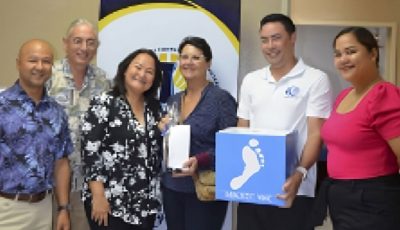SCC to seek govt meeting on looming manpower crisis
Businesses in the Commonwealth may need to have a sit-down meeting with the Inos administration to address a looming manpower crisis.
Saipan Chamber of Commerce president Alex Sablan said the need for the meeting becomes necessary, as he cited a statement of Lt. Ralph DLG. Torres when he said the CNMI needs 11,000 foreign workers.

Saipan Chamber of Commerce president Alex Sablan speaks during the chamber’s general membership meeting yesterday at the Charley’s Cabaret of the Pacific Islands Club Saipan. (Joel D. Pinaroc)
Torres was in Washington, D.C., last week to attend the Plenary Session of the Inter-Agency Group on Insular Areas where he stated the manpower requirements of the Commonwealth.
According to Sablan, the figure that the lieutenant governor gave “was spot on,” noting that there are approximately 11,400 foreign workers now in the Commonwealth.
“Approximately 11,400 foreign workers is what we have today in the CNMI but if all developers are successful in constructing their rooms, we will need 17,000 foreign workers,” Sablan said.
According to Sablan, based on recent numbers declared by developers that are actively seeking hotel constructions, the number of hotel rooms could swell to 10,000.
Best Sunshine International, Ltd. alone is projecting some 4,000 rooms.
The problem becomes apparent, as manpower needed for these hotel developments far exceeds 11,000. “And these developments (10,000 rooms) are on Saipan only,” Sablan said.
Currently, there are also developments ongoing on nearby Tinian and Rota.
CW1 concerns
Sablan further said the CNMI currently has a 13,399 quota for the CW1 visa.
The number will not increase, but will eventually reach zero, Sablan said, adding that the local population cannot sustain the looming deficit.
This is the reason the federal government created the CNMI-Only Transitional Worker visa classification, which allows employers in CNMI to apply for temporary permission to employ foreign workers who are otherwise ineligible to work under other nonimmigrant worker categories.
The CW classification provided a method for transition from the former CNMI foreign worker permit system to the U.S. immigration system.
However, the issuance of the CW1 visa will stop by 2019, as mandated by the federal government.
Sablan said the math “does not add up” anymore, as there are only a few thousand CW1 visas available, compared to the projected need of 17,000.
“What I am wondering is whether the CNMI as ‘public policy’ should pursue 10,000 rooms in the CNMI, given our limitations?” Sablan said.
The executive said he would recommend that government look into a “controlled development and managed growth” strategy to address these manpower concerns.



























